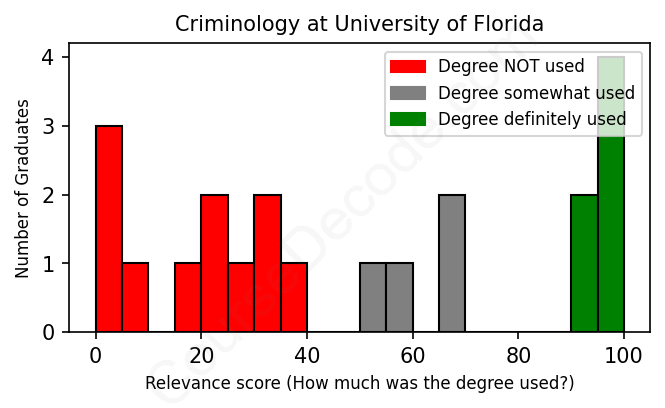
First, some facts. Of the Criminology graduates from University of Florida we've analyzed , here's how many have used (or NOT used) their degree in their career:

These are estimates based on AI analysis of 21 LinkedIn profiles (see below).
The verdict? Significantly below average. Overall, with an average relevance score of 48%, Criminology graduates from University of Florida have a much lower likelihood (-19%) of finding work in this field compared to the average graduate across all fields:
And for comparison, here's the chart for all profiles we've looked at across all degrees.
Also, after graduating, 57% of these graduates have pursued further education other than another Bachelor's degree (such as a Masters degree or other), compared to the average across all profiles of 35%. This suggests you may need more than just a Bachelors degree to be competitive as a Criminology graduate.
See the details:
|
Relevance score: 50% We think this person has gone into a career only somewhat relevant to their degree. We think this person has gone into a career only somewhat relevant to their degree.
DEGREE INFOGraduated in 2015 from University of Florida with a Bachelor's degree in Criminology. Also pursued further education since (see below). JOB HISTORY SINCE GRADUATIONFire Lieutenant Unknown Aug 2017 - 2022 FURTHER DEGREES DONE SINCE GRADUATINGUnknown degreeSanta Fe College 2015 - 2016 ABOUTNo information provided. |
The top 10 most common jobs done by the graduates we've analyzed (ranked most common to least) are:
After looking through this list of jobs held by individuals who graduated with a Criminology degree from the University of Florida, it's clear that the most common pathways tend to be in legal and criminal justice fields. A lot of graduates have found their way into positions such as legal interns, law clerks, and assistants within various judicial and law enforcement offices. These roles are directly relevant to criminology, involving applications of criminal law, legal systems, and knowledge of criminal behavior. This makes sense, as many people with a criminology background aspire to work within the criminal justice system either on the prosecution or defense side.
However, it’s also noticeable that quite a few grads have ventured into positions that aren’t directly tied to criminology, such as sales, administrative jobs, or roles in completely different fields like veterinary services or retail. These roles don’t utilize the criminological skills or knowledge gained during their studies, which could suggest that either they didn't find opportunities in their chosen field, or perhaps they decided to change career paths altogether. Overall, while there are definitely success stories of graduates landing jobs that are a perfect fit for their education, a significant portion seems to have diverged from those criminology-related opportunities. This mix shows that while a criminology degree offers a solid foundation for certain careers, the job market can lead individuals down various paths that don’t always align with their studies.
Here is a visual representation of the most common words in job titles for Criminology graduates (this is across all Criminology graduates we've analyzed, not just those who went to University of Florida):

When you look at the career trajectories of Criminology graduates from the University of Florida, it’s a mixed bag. Many people start out in jobs that are somewhat aligned with their degree, particularly those who graduated in the earlier 2010s. For instance, having externships or internships at places like district attorney offices and being involved in legal internships indicate a solid entry into legal careers, which is a logical path for Criminology majors. A good number of them have managed to climb up the ranks in the legal field, becoming assistant state attorneys or even moving into positions with the Department of Justice. This suggests that if you're aiming for a career in law or criminal justice, a degree in Criminology can definitely set you on a promising path right from the get-go.
However, not everyone follows a path directly tied to their Criminology education. Some graduates have ended up in unrelated sectors like sales or even roles like veterinary technicians, which is pretty far from criminology! Fast forward 5 to 10 years, and while some remain in the criminal justice sector, others may be in roles that don’t leverage their degree at all. While it’s clear that there’s a potential for good careers relevant to Criminology, it’s also evident that many graduates might find themselves exploring very different fields, whether by choice or circumstance. So, if you're considering Criminology, it’s definitely possible to find success in that field, but you may also need to keep an open mind about where your career could take you.
Getting a Bachelor’s degree in Criminology at the University of Florida, or really anywhere, can be a mixed bag in terms of difficulty. It’s not necessarily the hardest degree out there, but it definitely has its challenges. You’ll dive into a lot of complex topics like criminal behavior, justice systems, and maybe some research methods, which can get pretty intense. Plus, if you’re not a fan of reading or writing papers, you might find it a bit tougher since there’s quite a bit of both involved. Overall, it’s about average in terms of difficulty; it's achievable, especially if you're interested in the subject matter and stay organized with your studies. So, if criminology is your jam, you’ll probably find it rewarding, even if it can be a grind sometimes!
Most commonly, in the LinkedIn profiles we've looked at, it takes people 4 years to finish a Bachelor degree in Criminology.
Looking at the career paths of these University of Florida Criminology grads, it seems like some of them are making decent cash while others may be struggling a bit to hit that sweet spot. For instance, those who landed roles in legal or finance positions, like the folks at Bank of America or the Attorney General's office, probably have pretty good salaries, especially in the long run. On the other hand, those who started in retail or less specialized roles, like the grocery clerk or server positions, might not be raking in the big bucks just yet. So, it really varies! Overall, if they stick with their careers and move up the ladder, they should see their earnings increase, but right now, it's a mixed bag.
Here is a visual representation of the most common words seen in the "about" section of LinkedIn profiles who have a Bachelor degree in Criminology (this is across all Criminology graduates we've analyzed, not just those who went to University of Florida). This may or may not be useful:

Here are all colleges offering a Bachelor degree in Criminology (ordered by the average relevance score of their Criminology graduates, best to worst) where we have analyzed at least 10 of their graduates:
| College | Score | Count |
|---|---|---|
 California State University, Fresno California State University, Fresno
|
67 | 20 |
 George Mason University George Mason University
|
63 | 27 |
 Arizona State University Arizona State University
|
58 | 17 |
 Missouri State University Missouri State University
|
57 | 11 |
 The Ohio State University The Ohio State University
|
56 | 16 |
 Penn State University Penn State University
|
55 | 16 |
 Florida State University Florida State University
|
54 | 60 |
 West Virginia University West Virginia University
|
51 | 20 |
 University of Maryland University of Maryland
|
51 | 11 |
 John Jay College (CUNY) John Jay College (CUNY)
|
50 | 21 |
 University of South Florida University of South Florida
|
49 | 47 |
 Central Connecticut State University Central Connecticut State University
|
49 | 13 |
 University of Florida University of Florida
|
48 | 21 |
 The University of Texas at Dallas The University of Texas at Dallas
|
48 | 10 |
 Indiana University of Pennsylvania Indiana University of Pennsylvania
|
48 | 20 |
 Mississippi State University Mississippi State University
|
46 | 10 |